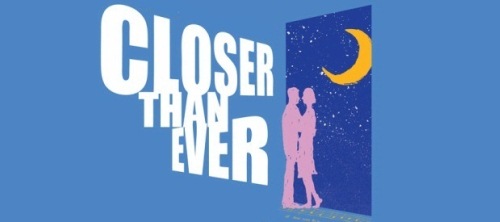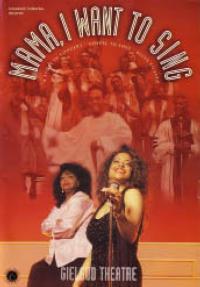
Acte I
The lights come up on four people standing in front of "Doors." They are modern, timeless, urban, hip, sophisticated, lost, and awestruck by the overwhelming choices before them.
The closed doors of unrequited love show us one man who bemoans unreturned affections. The lady in question pines after another man, who, it seems, yearns for the first man She Loves Me Not. A man tells a woman she's a goddess then proceeds to break up with her and, not surprisingly, the woman responds tersely You Want To Be My Friend?. An obsession with a woman drives a man to do crazy things. He resolves to stop, but then misses his obsessive behavior when he does stop What Am I Doin'?). After one too many bad relationships, a female zoologist resolves to be more like female animals that need the male species to reproduce and nothing more The Bear, The Tiger, The Hamster and The Mole.
The doors of blossoming love open and feelings are new, fresh and alive Like A Baby. A seemingly quiet, shy, unnoticed woman has a sexy secret to tell...but she's not saying a thing Miss Byrd.
Doors of a simpler time, long passed through, remind us that progress doesn't always make us happy The Sound of Muzak. The longings for lives he could have led makes a man realize that even if those longings are a given, he has happily made his choice One Of The Good Guys. An obsession with staying young makes physical exercise a seeming necessity and even though painful, the end result will be worth it There's Nothing Like It. In a bittersweet recounting, a woman surrenders to the life she's lived, without complaining Life Story.
Doors opening and closing, good and bad choices, happy and sad times-the ups and downs of life and love make us ever-hopeful for something better Next Time. We continue opening and closing doors on the positive and the negative, but in the long run, wouldn't change a thing I Wouldn't Go Back.
Acte II
As we begin Act II, doors continue opening and closing as three college friends grow up and grow apart, but work to remain connected Three Friends. A career-obsessed couple has trouble compromising their work for the sake of their baby Fandango. Another couple comes apart because the man is not "There" for his wife until it's too late. A woman in a mid-life dilemma is troubled by feelings of unrest, yet in the end, takes comfort in her surroundings Patterns.
Doors opening on hope show a man and woman each venturing into a second marriage (to each other) with a lovely, philosophical outlook Another Wedding Song. With great pride and joy, a man pays tribute to his father-who taught him the love of music and life in general If I Sing and a woman pays a jazzy, tongue-in-cheek tribute to her bass-playing boyfriend Back On Base.
Transitional doors show us that getting older is inevitable. Facing all the changes that happen along the way can be scary and frustrating-yet we move forward The March of Time. The legacy and life cycle between parents and children is sweetly reflected by the men in "Fathers Of Fathers." The heartbreak of love, both lasting and fleeting, is shared by the women in "It's Never That Easy/I've Been Here Before."
Finally, some doors that have been locked open up and shed light on the trials, hopes, joys and pains that other doors have exposed. Whether opened or closed, these doors "can only make us stronger than ever, clearer than ever…'Closer Than Ever.'"
In 1984, Maltby began compiling a series of older songs and new song ideas to form an evening of musical short stories, which he labeled the "Urban File". In particular, he wanted to make use of one of his favorite songs, "The Bear, The Tiger, The Hamster, and The Mole", which had been cut from Maltby and Shire's 1983 musical Baby. Maltby assembled other cut songs from earlier musicals such as The River, Love Match and The Sap of Life to go with this particular song. The "Urban File" also contained lyric fragments, musical ideas, song fragments, rhythmic ideas, philosophical observations, and biograpical details of friends and acquaintances as potential material for songs. During this time, Maltby was occupied with Song and Dance, and Shire was busy composing film scores, so that the "Urban File" was not a primary project at the time.
In 1987, Lynne Meadow, artistic director of the Manhattan Theatre Club, approached Maltby and Shire to ask for a song for a topical revue on urban themes that director John Tillinger was creating. Maltby showed them his "Urban File", which Tillinger and Meadow found appealing. Tillinger had initially planned on only a small amount of music, but after seeing the file, altered his original concept, with the final product being six songs by Maltby and Shire and one song by Edward Kleban. The work was a critical success with both the public and critics. New songs for this production included "There's Nothing Like It", "Miss Byrd" and "One of the Good Guys". They also wrote "Three Friends" for the revue, but finally did not use it. The music was interspersed with dramatic sketches on urban themes by various playwrights, including Christopher Durang, A. R. Gurney, Terrence McNally, Arthur Miller, Shel Silverstein, Ted Tally, and Wendy Wasserstein. Titled Urban Blight, the revue premiered in May 1988 and ran for six weeks at the Manhattan Theatre Club. The cast included Larry Fishburne, John Rubinstein, Oliver Platt, Nancy Giles, Faith Prince, Rex Robbins and E. Katherine Kerr.
In the Fall of 1988, the playwright and director and pianist Steven Scott Smith, an assistant to Maltby, approached Maltby and Shire for permission to use the "Urban File", with some other unused songs of theirs, to assemble a cabaret evening consisting entirely of their music. Maltby and Shire approved this, and Smith began to assemble a review titled Next Time, Now! With director Patrick Scott Brady and choreographer Arthur Faria. One of the songs added into this show was "Life Story". The one hour cabaret show opened in January 1989 at Eighty-Eight's, a nightclub in Greenwich Village, with Brent Barrett, Michael Brian and Lynne Wintersteller as the show's performers. The work was a critical success with both the public and critics, and Maltby and Shire decided to expand this product into a full evening-length show.
Maltby and Shire received support to expand the show when producers Janet Brenner, Michael Gill, and Daryl Roth came on board. They wanted to turn the production into a two act evening, which required new songs and additional material from the "Urban File". The show also added one more actress, Sally Mayes, to the cast. New songs written for the expansion include the opening number, "Doors", "You Want To Be My Friend?", "Fandango", "If I Sing", "The March of Time", "Back On Base", and the finale, "Closer Than Ever". "Another Wedding Song", written by Shire and his wife Didi Conn for their wedding, was also added into the show at this time. The full-scale version of the show went through a trial run at the Williamstown Theatre Festival in Massachusetts during the summer of 1989. Marcia Milgrom Dodge was hired to choreograph the expanded show and Maltby became Smith's co-director. Well received by audiences, the show headed for New York City.
Closer Than Ever is a musical revue in two acts, with words by Richard Maltby, Jr. and music by David Shire. The revue contains no dialogue, and Maltby and Shire have described this show as a "bookless book musical". The show was originally conceived by Steven Scott Smith as a one act revue entitled "Next Time Now!", which was first given at the nightclub Eighty-Eights.
The success of "Next Time Now!" led to a much expanded production retitled Closer Than Ever that was co-directed by Maltby and Smith. This production began its life at the Williamstown Theatre Festival in Massachusetts during the Summer of 1989. It came to New York the following Fall, opening in previews on 17 October 1989, and officially opening on 6 November 1989 at the off-Broadway Cherry Lane Theatre, where it ran for 312 performances. The cast included Brent Barrett, Sally Mayes, Richard Muenz, and Lynne Wintersteller.
Next Time Now (original title) - A cabaret version of this musical revue was produced earlier using the title NEXT TIME NOW.
Aucun dossier informatif complémentaire concernant Closer than ever
Aucun dossier informatif complémentaire concernant Closer than ever

Version 1
Closer than ever (1989-11-Cherry Lane Theatre-Off Broadway)
Type de série: Original Off-BroadwayThéâtre: Cherry Lane Theatre (Broadway (Off) - Etats-Unis) Durée : 7 mois 3 semaines Nombre : 24 previews - 288 représentationsPremière Preview : 17 October 1989
Première: 06 November 1989
Dernière: 01 July 1990Mise en scène : Richard Jr Maltby • Steven Scott Smith • Chorégraphie : Aucun • Producteur : Star(s) : Avec: Avec: Brent Barrett, Sally Mayes, Richard Muenz, Lynne Wintersteller

Version 2
Closer than ever (1995-02-Bridewell Theatre-London)
Type de série: RevivalThéâtre: Bridewell Theatre (Londres - Angleterre) Durée : 3 semaines Nombre : Première Preview : 05 February 1995
Première: 09 February 1995
Dernière: 04 March 1995Mise en scène : Clive Paget • Chorégraphie : Producteur : Star(s) : Avec: Lyanna Iveson, Vicky Simmonds, Richard Tremblay, Clive Paget

Version 3
Closer than ever (1997-??-Nederlandse tour)
Type de série: Nederlandse TourThéâtre: Nederlandse Tour ( - Pays-Bas) Durée : Nombre : Première Preview : Inconnu
Première: Inconnu
Dernière: InconnuMise en scène : ???? ???? • Chorégraphie : ???? ???? • Producteur : Star(s) : Avec: Avec: Doris Baaten, Alberto ter Doest, Marjolein Keuning, Henk Poort

Version 4
Closer than ever (1998-07-Jermyn Street Theatre-London)
Type de série: RevivalThéâtre: Jermyn Street Theatre (Londres - Angleterre) Durée : 1 mois Nombre : Première Preview : 20 July 1998
Première: 20 July 1998
Dernière: 22 August 1998Mise en scène : Matthew White • Chorégraphie : Sam Spencer-Lane • Producteur : Star(s) : Avec: Helen Hobson, Beverley Klein, Mark McKerracher, Gareth SnookCommentaires : Four singers with 24 songs sing about love, rejection, obsession, fatherhood, marriage, sex, friendship, getting old. There is no plot, but, a bit like Sondheim’s “Company”, a great deal of emotional life is covered as the characters slide in and out of a mocked up subway train. This was an intimate but “very American” entertainment.
Pas encore de video disponible pour ce spectacle